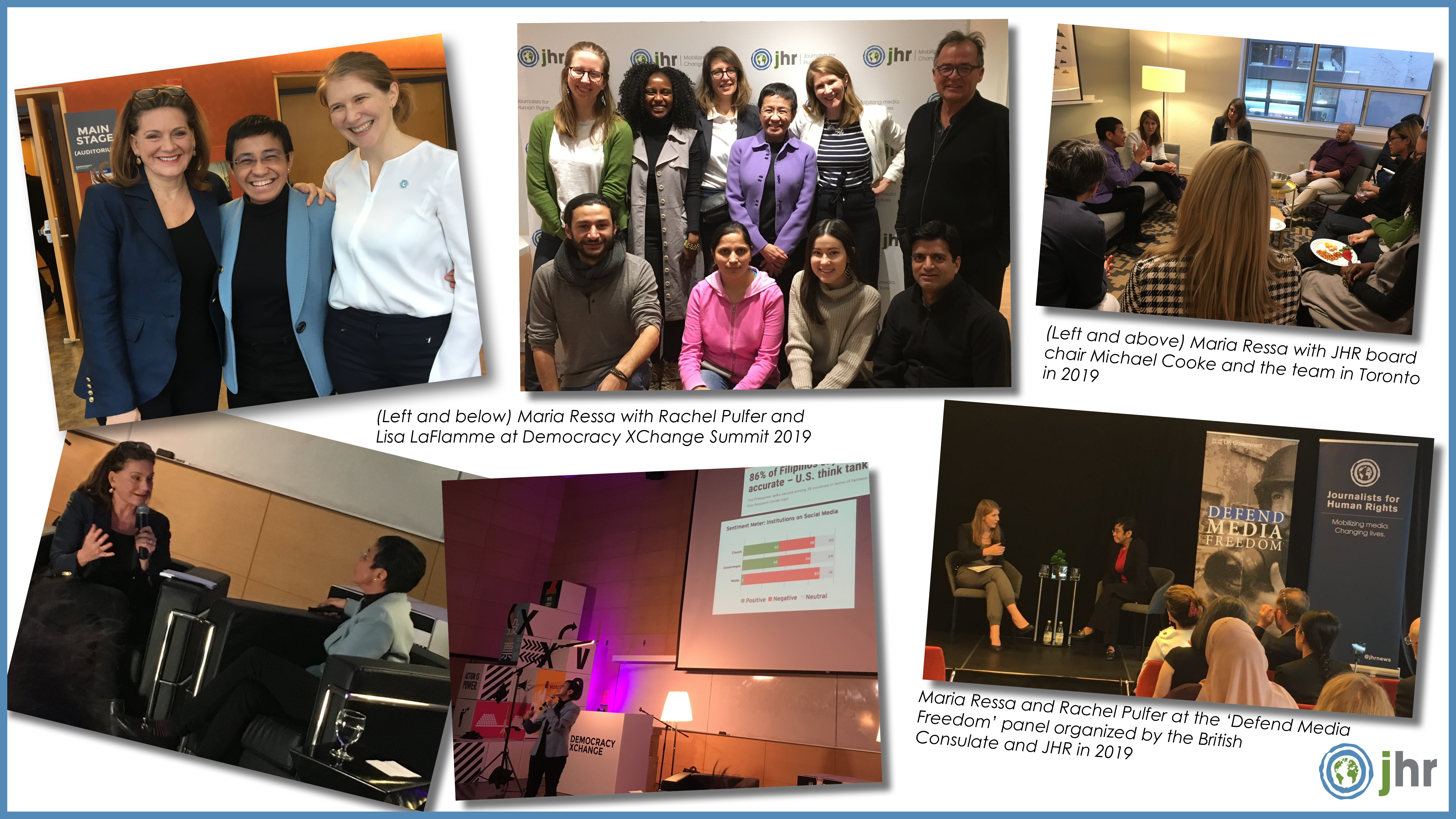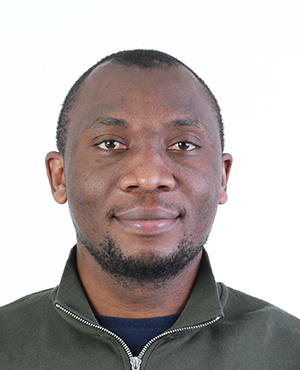October 9th, 2021
This week’s highlights:
- Congratulating Maria Ressa, winner of Nobel Peace Prize 2021
- NIGHT FOR RIGHTS 2021 Meet the Speakers: Patrick Egwu
- Take the survey: Online threats and harassment against media professionals
- We’re hiring: Junior Curriculum Associate (MMFC program) & Regional Trainer (Solutions
Journalism program)
Congratulating Maria Ressa,
winner of Nobel Peace Prize 2021

JHR was overjoyed to learn yesterday about Filipina journalist Maria Ressa’s richly deserved Nobel Peace Prize win. Ressa has been recognized for her “efforts to safeguard freedom of expression, which is a precondition for democracy and lasting peace”, along with fellow journalist Dmitry Muratov.
Ressa is a journalist par excellence whose online publication Rappler has drawn the ire of President Rodrigo Duterte of the Philippines. She has been battling baseless legal charges for years, which JHR has repeatedly condemned as a trumped-up effort to silence her and her publication.
JHR feels privileged to have enjoyed Ressa’s insight and company on numerous occasions, from our work together at the Democracy XChange summit and the ‘Defend Media Freedom’ panel (that we organized with the British Consulate) in 2019 to joining her for Press Freedom Canada’s 2020 webinar. On World Press Freedom Day this year, we joined the #HoldTheLine coalition in reiterating our support for Ressa as she continues to risk her life and liberty for press freedom in The Philippines.
The international journalist community owes a huge debt of gratitude to Maria Ressa for her leadership in this tireless fight. Congratulations, Maria! We salute your courage and celebrate your prize as a true victory for journalists and media freedoms world-wide.
NIGHT FOR RIGHTS 2021
Meet the Speakers: Patrick Egwu,
2021-2022 Gordon N. Fisher/JHR Fellow
at Massey College

As we draw closer to Night For Rights 2021, JHR is pleased to introduce Patrick Egwu, this year’s recipient of the JHR/Gordon N. Fisher Fellowship at Massey College, as one of the speakers at the gala!
Patrick Egwu is a Nigerian freelance investigative journalist. His work on human rights, social justice, migration, and global health in sub-Saharan Africa has been published by Foreign Policy, NPR, Daily Maverick, Christian Century, America Magazine, and elsewhere. Patrick recently completed an Open Society Foundation fellowship on Investigative Reporting at the University of Witwatersrand, South Africa. He also has master’s and bachelor’s degrees from the University of Nigeria, Nsukka. In February, he won the 2021 International Center for Journalists’ Global Health Crisis Award for Covid-19 reporting.
We speak to Patrick to learn more about his career and what he hopes to share with us at the gala.
What does receiving the JHR/Gordon N. Fisher fellowship at Massey College mean for you and your career?
I was really chuffed when I got the email back in June that I had been selected for this year’s fellowship. I’m quite aware how competitive the selection process is. I’m happy to be among the cohort for this year and the selection shows that my work, which highlights issues around human rights and social justice in Nigeria and sub-Saharan Africa, is recognized and appreciated by the esteemed judging committee. With this fellowship, I am committed to continue reporting human rights and social justice issues not just in Nigeria, but elsewhere on the continent.
What do you wish people understood better about journalism in Nigeria?
Nigeria has a vibrant media landscape but is also a somewhat dangerous place to do journalism. Newsrooms are raided by security forces, their websites/emails jammed and phones are bugged while journalists are arbitrarily arrested and hunted for doing public interest stories that expose corruption and the officials involved. The civic space is currently under attack and about four months ago, the government banned the use of Twitter while citizens had to navigate the platform with VPNs. Three Nigerian journalists were killed between 2019 and 2020 while on assignment. However, despite this and a lack of funding and resources, Nigerian newsrooms are resiliently building a culture of journalism that can hold power to account.
This interview has been condensed. Read Patrick Egwu’s full interview here.
PS: It’s the last chance to secure your spot at the 2021 Night For Rights! Tables for up to 8 people are available for $8000, individual tickets for $1000, and please visit www.night4rights.com to contact us for sponsorship opportunities.
We are grateful to our community for their sponsorships, which includes generous Partner level contributions from CBC and Global News, as well as table purchases from Massey College and New Gold. This year, mindful of potential public health concerns, we’re also offering our supporters the opportunity to join the party online at a fabulous virtual gala experience! Virtual attendees may sign up for the premium experience available to residents of the Greater Toronto Area (that comes with a virtual table for 8 people, three-course meals delivered at home and sponsor recognition).
We will be announcing more speakers and other event highlights on our website and social media in the coming days. Stay tuned!
Ipsos and CBC Survey: Online threats and
harassment against media professionals
In the last few years, online threats and harassment targeting journalists, news crews and media professionals have become more common. While some international reports have helped document this phenomenon, there is no systematic study available for Canada.
A spike in online harassment, in particular of women and journalists of colour, which JHR Executive Director Rachel Pulfer spoke about in a series of radio interviews across Canada on Thursday, underscores the ugly new environment for journalists in Canada. Media organizations issued an important statement indicating that such threats and harassment of journalists will not be tolerated in Canada. However more needs to be done to understand the true scope of the problem and build
mechanisms to ensure greater accountability and the enforcement of the Criminal Code when it comes to incidents of hatespeech.
That’s why Journalists for Human Rights, in partnership with a network of other journalism associations and the CBC, is sharing this industry-wide survey of media professionals about online hate and harm against media professionals. The survey is being conducted by Ipsos and is sponsored by CBC/Radio-Canada.
Anyone who works in journalism is invited to participate, regardless of whether or not you’ve faced online harassment. This survey will provide our industry with data to help us advocate for initiatives that address this problem and to support those who experience online harassment.
Please click on the link below to complete the Ipsos survey, available in French and English, by October 11.
If you have questions about the survey, please see this FAQ.
Finally, if you do experience online harassment and need help, please make sure to talk to someone you trust and use the resources available to you. If the situation is causing significant distress, you can call 1-833-456-4566 (24/7), or visit Crisis Services Canada for text or chat options.
JOIN THE JHR TEAM:
We’re hiring for two positions!
Journalists for Human Rights (JHR) is seeking to hire a Regional Trainer to conduct workshops and manage newsroom partnerships in eastern Canada for its Solutions Journalism program.
CONTRACT TYPE: Part-time (30 hours per week)
CONTRACT DURATION: One year
START DATE: October 2021
JHR is also looking to urgently hire a Junior Curriculum Development Associate to support the coordination, communication and administrative work associated with the curriculum development for its ‘Mobilizing Media to Fight COVID-19’ program. The program is currently being implemented in 12 African and Middle Eastern countries.
LOCATION: Toronto, Head Office
CONTRACT DURATION: Short-term
START DATE: October 2021
Click here for full job descriptions.
Your support allows us to continue our innovative work around the world!
Land Acknowledgement
We wish to acknowledge the land on which the Journalists for Human Rights’ head office operates and
recognize the longstanding relationships Indigenous nations have with these territories. For thousands
of years it has been the traditional land of the Huron-Wendat, the Seneca, and most recently, the
Mississaugas of the Credit River. Tkaronto (Toronto) is in the Dish with One Spoon Territory and is
home to Indigenous peoples from many nations across Turtle Island who continue to care for this land
today.
To read more on JHR’s land acknowledgement, click here.




